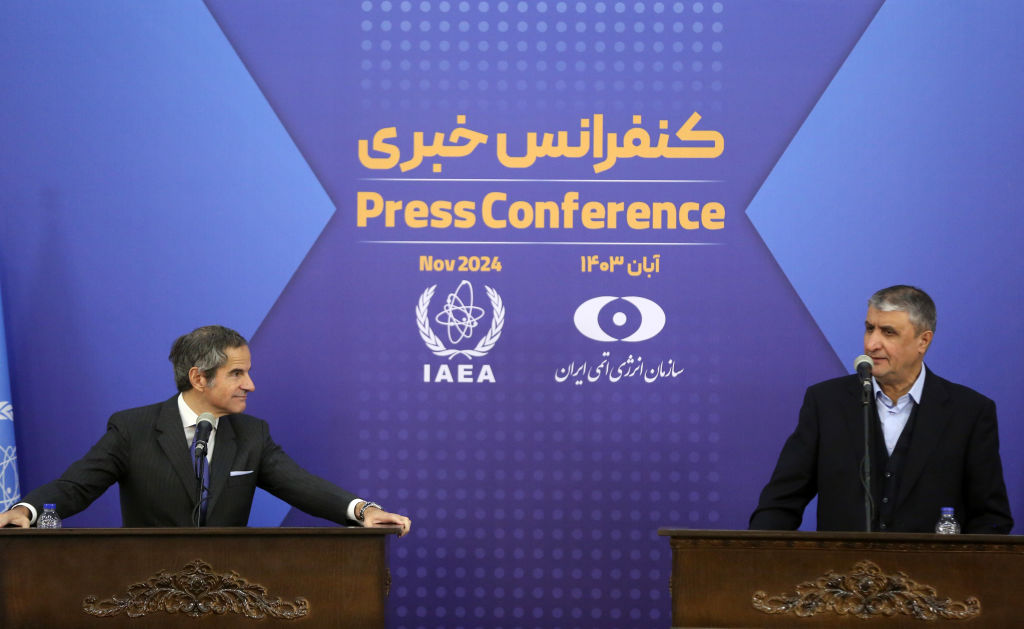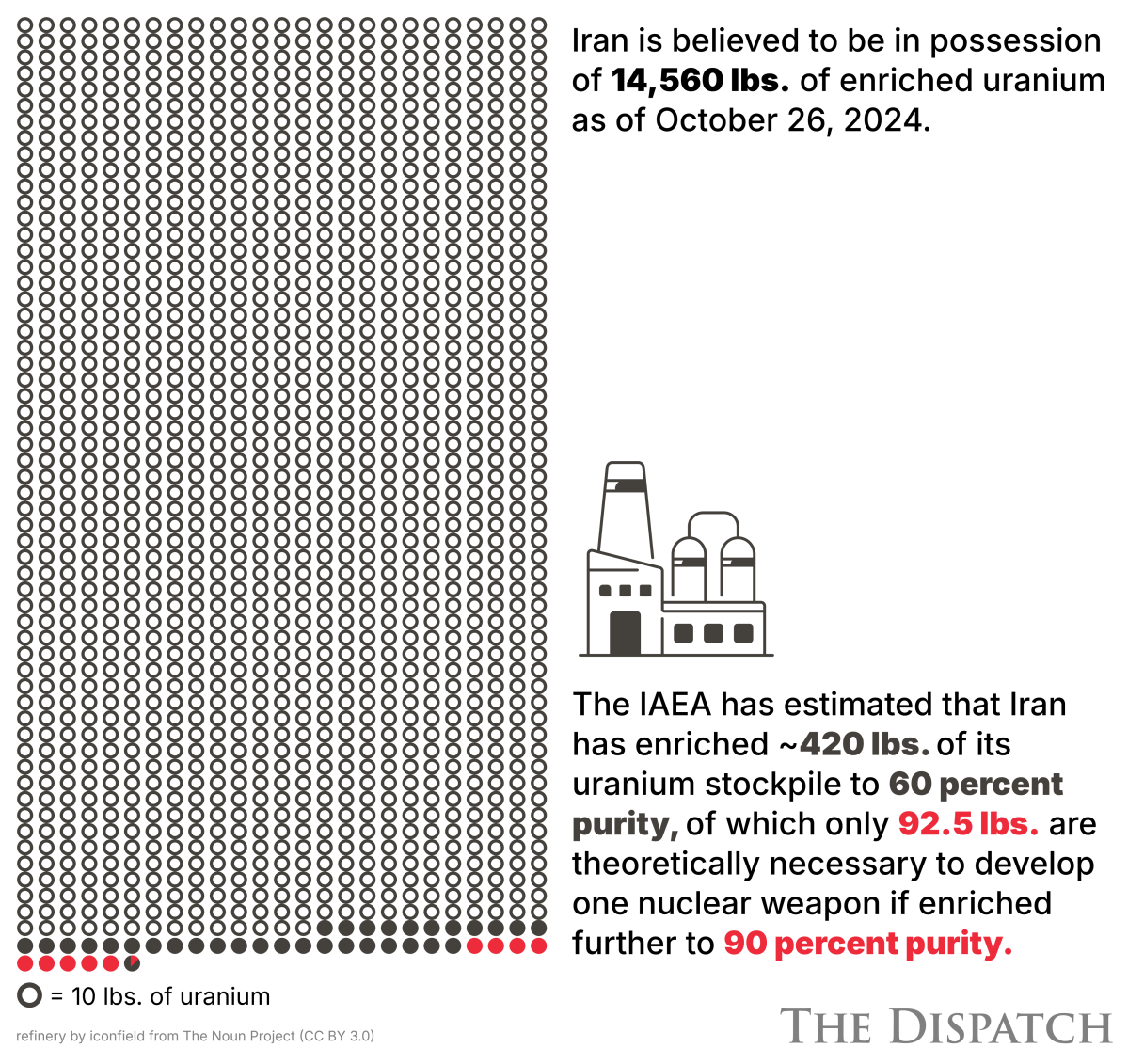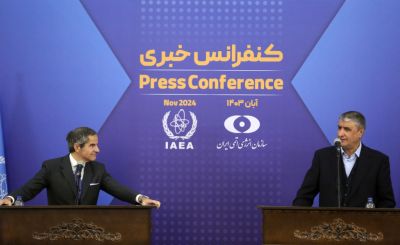Happy Thursday! Chinese President Xi Jinping isn’t the only dictator who can do zoo-animal diplomacy. Russian President Vladimir Putin got in on the action recently, sending 70 animals to a zoo in North Korea, apparently as a gesture of friendship.
With friends like that, the pandas at the Smithsonian National Zoo have got to be counting their blessings we don’t owe any favors to Pyongyang.
Quick Hits: Today’s Top Stories
- Secretary of Defense Lloyd Austin confirmed on Wednesday that the Biden administration would supply Ukrainian troops with anti-personnel land mines, reversing previous restrictions on their use. The Pentagon reportedly received assurances from Ukraine that it would not use the mines in densely populated areas or offensively, but rather to fortify Ukrainian defenses within the country’s internationally recognized borders.
- Citing “specific information of a potential significant air attack,” the U.S. embassy in Kyiv temporarily closed on Wednesday. The Ukrainian capital, and several other regions of Ukraine, were under air raid warning on Wednesday for what the air force described as a missile threat. The Ukrainian armed forces also said Wednesday that they had successfully struck a command post in the Russian region of Belgorod, near the Ukrainian border. And, following the authorization by President Joe Biden for Ukraine to use U.S.-made long-range missile systems to strike Russian territory, Ukraine also used U.K.-made Storm Shadow missiles to attack Russia for the first time Wednesday.
- President-elect Donald Trump on Wednesday chose former acting Attorney General Matthew Whitaker to serve as U.S. ambassador to NATO. Whitaker, who has served as a U.S. attorney in Iowa and chief of staff to Trump’s first attorney general, Jeff Sessions, has no traditional foreign policy experience but has been an outspoken critic of Trump’s criminal indictments. “Matt is a strong warrior and loyal Patriot, who will ensure the United States’ interests are advanced and defended,” Trump said in a statement.
- Elon Musk’s space technology company, SpaceX, was forced on Tuesday to abort an attempted “catch” of a rocket booster in the sixth test of its Starship system. The Super Heavy booster, which powers the Starship system’s lift-off, is designed to reverse course after detaching from the Starship spacecraft and maneuver itself back into the launch and landing structure to be reused on future flights—an unprecedented maneuver achieved for the first time last month in Starship’s fifth test. This time, however, the booster made what SpaceX considered a successful “soft” landing in the Gulf of Mexico. Trump was in attendance at the launch near Brownsville, Texas.
- Jimmy Lai—a leader in the Hong Kong pro-democracy movement—on Wednesday testified during his national security trial that he had “never” engaged in foreign collusion. Lai, the owner of the now-shuttered Apple Daily newspaper, is accused of conspiring with foreign powers and attempting to influence the policy of foreign countries toward China and Hong Kong. “The core values of Apple Daily are actually the core values of the people of Hong Kong,” said Lai, citing, “rule of law, freedom, pursuit of democracy, freedom of speech, freedom of religion, freedom of assembly.” Lai, who is 76, has reportedly been held in solitary confinement since 2020.
- Doctors Without Borders/Médecins Sans Frontières (MSF) said Tuesday it would stop operating in the Haitian capital of Port-au-Prince and its metropolitan area, following an escalation in gang violence and alleged threats to staff by Haitian police. MSF, one of the main providers of health care in the country, claimed Haitian police officers had stopped its vehicles, threatened staff with violence and rape, and suggested they would begin executing patients and destroying vehicles.
- Prosecutors in the New York criminal case against Trump on Wednesday asked the presiding judge to potentially defer sentencing until the president-elect is scheduled to leave office in 2029. Judge Juan Merchan was already considering a request from Trump’s lawyers to overturn the case in light of the Supreme Court’s presidential immunity ruling earlier this year, and on Wednesday Trump’s lawyers also asked for an “immediate dismissal” to facilitate the presidential transition. Sentencing was otherwise set for November 26.
- The House Ethics Committee did not reach an agreement Wednesday on releasing the contents of an investigation into former Rep. Matt Gaetz of Florida, Trump’s nominee for attorney general. Several senators have requested the results of the investigation of allegations that Gaetz paid individuals for sex, had sex with a minor, engaged in illicit drug use, and gave people improper favors. Republican House Speaker Mike Johnson has opposed releasing the report and the Republicans on the ethics panel, who are equal in number to the Democrats, seem to have moved in unison to block the report’s release. Two Democratic congressmen have moved to force a vote on the House floor on releasing the panel’s report. The panel will meet again in December and, in the meantime, the committee is reportedly planning to continue work on the report.
- A powerful “bomb cyclone” storm struck the Pacific Northwest on Tuesday night and Wednesday morning, killing at least two people and leaving 450,000 homes and businesses without power. It comes just before multiple storms are expected to hit the region, including an “atmospheric river” above California that is predicted to bring 10-15 inches of rain this week.
- Comcast announced on Wednesday that it plans to spin off NBCUniversal’s cable channels—including MSNBC, USA Network, and CNBC—into a separate company. The move is apparently an attempt to shield NBCU’s streaming service and theme parks from the long-term decline of traditional television, though NBCU’s streaming service, Peacock, is still not profitable.
‘Maximum Pressure’ Redux

When CNN’s Becky Anderson accused former Iran envoy Brian Hook of “swerving” her questions about President-elect Donald Trump’s Middle East policy following this month’s presidential election, Hook pushed back.
“President Trump’s foreign policy is hiding in plain sight,” Hook—who’s reportedly leading the Trump transition at the State Department—told her. “It’s fairly obvious what he did in the first term, and it’s obvious that he isolated Iran and he weakened Iran economically.”
And indeed, of all the policy areas likely to experience a shift at noon on January 20, the policy change on Iran, in particular, seems the most obvious in light of Trump’s first term. As Iran now sends mixed signals on its attempts to develop a nuclear bomb, Trump seems poised to reinstate his “maximum pressure” campaign at an uncertain time for the region.
Since 2021, Iran has consistently grown its stockpile of uranium enriched to 60 percent purity. Weapons-grade uranium is concentrated to 90 percent—an easy technical step from 60 percent enrichment. In recent months, members of the board of the International Atomic Energy Agency (IAEA)—the U.N.’s nuclear watchdog—have voted to censure Tehran for its failure to comply with the IAEA’s oversight efforts and continuing to enrich uranium, though the effort was not legally binding on any of the board’s members or on Iran.
That pattern of bad behavior and censure looked set to repeat itself this week, after IAEA Director General Rafael Grossi and other representatives visited Tehran last week to discover yet more uranium enriched to 60 percent. A report from the agency viewed by several news outlets this week estimated that as of mid-October, Iran had increased its supply of 60 percent uranium by almost 40 pounds since the last report in August. Iran is now estimated to have about 400 pounds of uranium enriched to near-weapons grade.
That amount of atomic material, if enriched further, is sufficient to fuel several nuclear bombs, according to IAEA’s estimates. About 92 pounds of 60-percent-enriched uranium could create one nuclear bomb if enriched to 90 percent. U.S. Secretary of State Antony Blinken has suggested in recent months that Iran’s “breakout time”—the time needed to achieve a nuclear warhead—is somewhere between one and two weeks. “Breakout time is virtually zero at the moment,” Jason Brodsky, policy director of United Against Nuclear Iran, told TMD.

Grossi returned to Vienna apparently having extracted a promise from Iran’s leaders to cap the amount of uranium it had enriched to 60 percent at roughly current levels. But later reporting suggested that the promise was actually contingent on the board of the IAEA not censuring Iran once again. France, the United Kingdom, and Germany—the so-called “E3” countries in the 2015 Iran nuclear deal—and the United States have pushed for the move in recent days.
The E3’s posture toward Iran has changed in recent years. “It’s not 2017, when the Trump administration came in during its first term, and the E3 was wedded to the Iran nuclear deal,” Brodsky said. “The E3 recognize that the Iran nuclear deal of 2015 is dead. Their threat perception with respect to Iran has changed after Iran’s arming of Russia against an EU candidate country, Ukraine.”
The U.S. support for the censure is also a departure from the Biden administration’s previous policies. A 60 percent enrichment cap was also reportedly part of the backroom deal the Biden administration struck in the summer of 2023, though the agreement was obviously short-lived. Now, though, the U.S. is on board with a European attempt to drop the hammer. “We remain tightly coordinated with our E3 partners in advance of the IAEA Board of Governors meeting, and we strongly support efforts to hold Iran accountable,” State Department spokesman Matthew Miller said Tuesday.
The vote to censure could take place as soon as today, though this time the measure may actually have some teeth, as European powers try to signal to the incoming Trump administration they’re willing to exact costs on Iran. “The E3 is rightly pressing ahead with the censure resolution, which would, for the first time, request a comprehensive report from the IAEA on Iran’s nuclear program and its interactions with the agency,” Brodsky told TMD. “And that is setting the table for the invocation of the snap-back sanctions mechanism, which is due to expire in October 2025.”
Those severe sanctions on Iran would “snap back” into place on the 10-year anniversary of the 2015 Iran nuclear deal, though then-President Donald Trump’s decision to remove the U.S. from the deal in 2018 effectively reinstated those sanctions on the U.S. side. Trump pursued a “maximum pressure” campaign on Iran, which included significant sanctions and an oil embargo in an attempt to weaken the Iranian economy and isolate it diplomatically.
Republicans have accused the Biden White House of failing to fully enforce many of those sanctions that are still on the books. As we’ve previously reported, Iran has also managed to evade sanctions, with China’s help.
The first Trump administration was also willing to take military action against Iran, including assassinating Qassem Suleimani, the commander of Iran’s Islamic Revolutionary Guard Corps responsible for attacks by Iranian proxies in December 2019 that injured several American forces and killed a U.S. contractor. “Striking [Suleimani] showed Iran a kind of resolve that had long been absent from U.S. policy,” the former leader of U.S. Central Command who coordinated the strike, Kenneth F. McKenzie Jr., wrote in May for The Atlantic. “If we plan to remain in the Middle East, we must be prepared to show that same resolve. The risk of escalation is inevitable but manageable; it is the refusal to accept this risk that has hobbled our policy for so long.”
Throughout the Biden administration, Iran has pushed the envelope in more ways than just its nuclear program. Its proxies have waged brutal and relentless war on Israel, struck U.S. targets in Iraq and Syria, and threatened global shipping in the Red Sea, all with Tehran’s support. Iran itself has twice in the last year launched attacks on the Jewish state—the first direct confrontations between the countries to date. In response, Israel in October struck Iran’s missile production facilities and air defense systems, leaving its nuclear assets undefended against any potential future strike for a time. The Biden administration urged Israel not to strike Iran’s nuclear or energy sites ahead of its counterattack.
Iran has also threatened American political figures and dissidents living in the U.S.—including Trump himself. The Justice Department earlier this month detailed a plot by Iranian operatives to assassinate Trump and Masih Alinejad, a prominent Iranian dissident and U.S. citizen. So far, the Biden administration has mainly responded with indictments against the accused perpetrators of these attempts, many of whom are in Iran. “You can imagine that there’s likely no love lost when a president-elect has actually almost been killed by a would-be assassin’s bullet and has been briefed on multiple assassination plots unfolding against him by a state actor,” Rich Goldberg, who worked on the National Security Council during Trump’s first administration, told Jamie on the Dispatch Podcast this month.
“You cannot allow that sort of open season on Americans like that from a state actor,” he said, describing plots to assassinate and kidnap Americans. “There has to be a very clear message that if you are thinking about touching—if you try to kill an American like that, it’s an act of war.”
The incoming Trump administration seems poised to go right back to its maximum pressure campaign of old, enforcing fully the sanctions and the oil embargo, including by potentially punishing Chinese ports that accept Iranian oil. It remains to be seen whether or how Iran will respond, especially if a second Trump administration also applies military pressure. “I think Israel has shown the world that if you undertake a strike on Iranian soil, World War III will not necessarily break out,” said Brodsky. “So I think that we need to learn some lessons from these experiences on how to appropriately and adequately deter the Islamic Republic from Israel’s experience over the last few months.”
Worth Your Time
- Why is modern American architecture so ugly? Artist Megan Gafford argues in her Fashionably Late Takes Substack that it’s because we abandoned our home-grown modern tradition: Art Deco. “If America was supposed to be Art Deco, then what happened to that muscular aesthetic decked out with delicate details? It was the last ornamental architectural style before an infestation of austere cubes degraded the New York City skyline—and that of metropolises the world over,” she said, before delving into the artistic, cultural, and economic trends that created “glass boxes” everywhere. “Unlike the Modernist buildings that always seem in need of a pressure wash, which sooner or later become fixtures of urban blight, ornamental architecture benefits from the patina of time. … Or in the extreme, entropy and tragedy transform beautiful architecture into romantic ruins like Heidelberg Castle. Ornamental architecture is like an old growth forest.”
- Democrats are already deep into debates about how to regain Congress and the White House, and Sen. Chris Murphy of Connecticut has been one of the loudest voices arguing for a major ideological shift. In an interview with New York magazine, he makes his case for a rejection of “neoliberalism” and globalization: “People want to feel power over the arc of their lives, and the concentration of corporate power has eroded people’s personal economic agency,” he said. “And then people want to feel like they’re part of something unique. They want to have a unique national identity or a unique local identity. Our borders started to get erased and our culture started to become flattened, and we all belong to the exact same transnational economy. Life began to feel very empty and hollow and far too homogenous for a lot of Americans.”
Presented Without Comment
USA Today: Thieves Steal More Than $1 Million Worth of Guy Fieri and Sammy Hagar’s Santo Tequila
In the Zeitgeist
Bud Light got into some … trouble last year over its marketing strategy. But the beer company is really shifting gears with its new series of commercials featuring comedian Shane Gillis. (If you don’t know who he is, ask your brother.)
Toeing the Company Line
- In the newsletters: Scott examined (🔒) Trump’s likely tariff policies, and Nick argued (🔒) that every Matt Gaetz, Pete Hegseth, or RFK Jr. has a mirror on the left and that their nominations set a precedent—not that Trump cares.
- On the site: Charlotte profiles former Gov. Mike Huckabee, Trump’s nominee for U.S. ambassador to Israel, Jessica Gavora argues the Biden administration flipped Title IX on its head to justify biological boys competing in girl’s sports, Charles reports on how RFK’s nomination is being received by pro-life senators, and Kevin says there are problems with the phrase “credibly accused” as Trump has nominated so many men with sexual misconduct allegations in their past.
Let Us Know
What do you want to see from a Trump administration policy toward Iran?








Please note that we at The Dispatch hold ourselves, our work, and our commenters to a higher standard than other places on the internet. We welcome comments that foster genuine debate or discussion—including comments critical of us or our work—but responses that include ad hominem attacks on fellow Dispatch members or are intended to stoke fear and anger may be moderated.
With your membership, you only have the ability to comment on The Morning Dispatch articles. Consider upgrading to join the conversation everywhere.